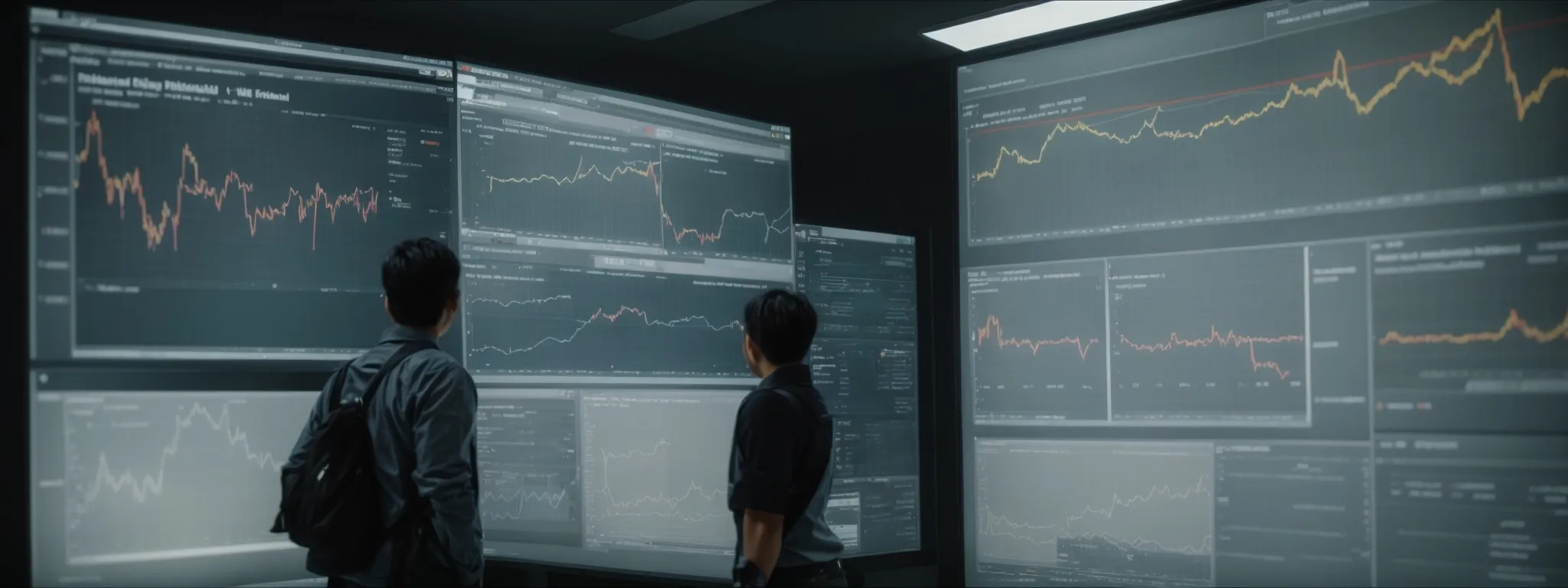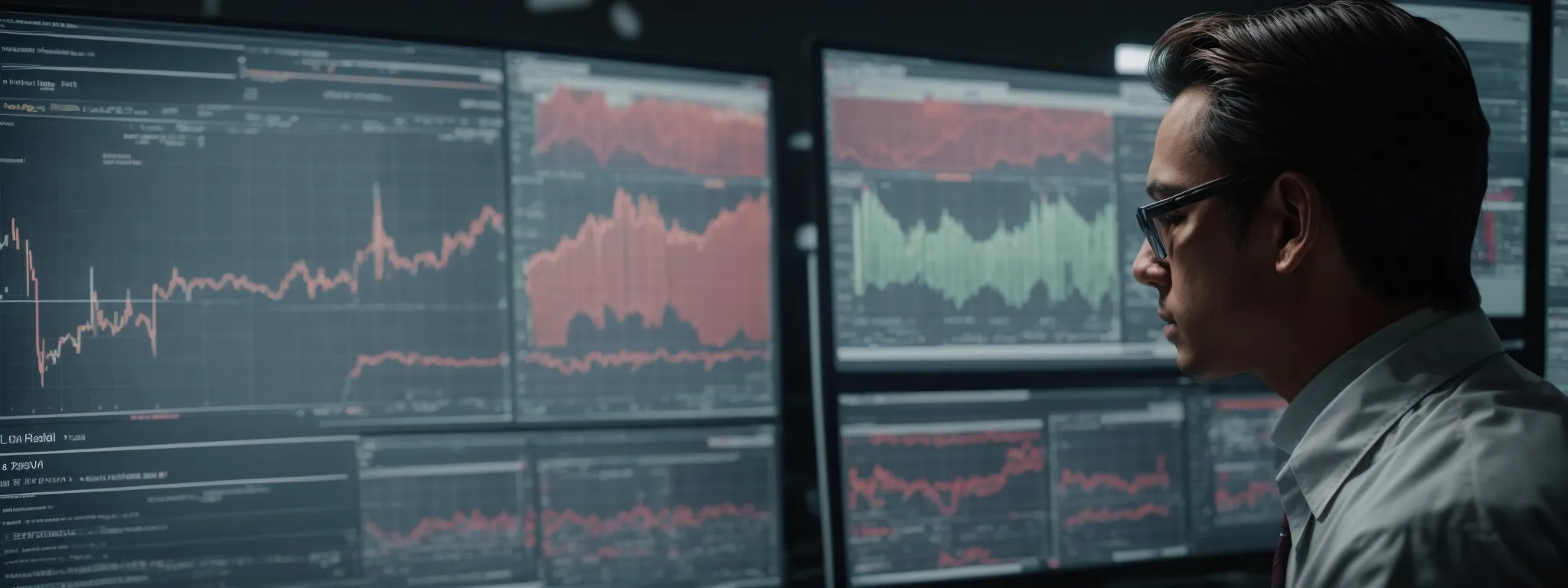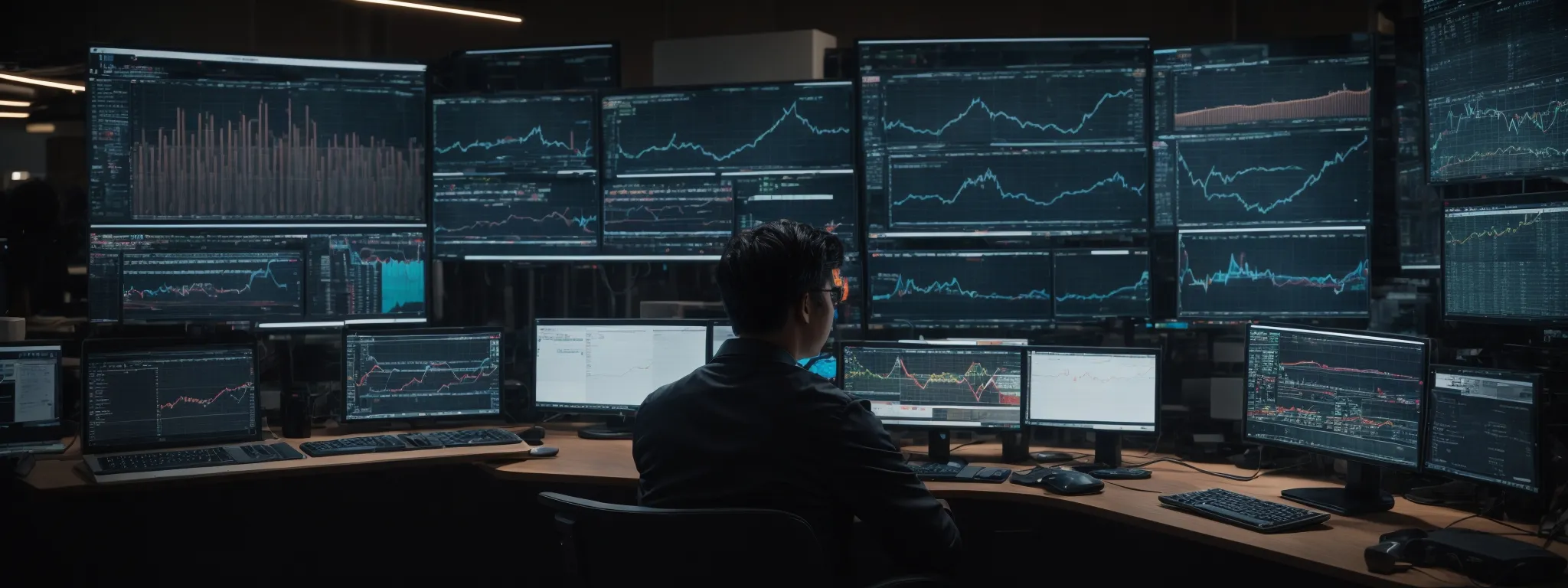Correlation Causation SEO
Understanding Correlation vs. Causation in SEO Success In the dynamic field of Search Engine Optimization, distinguishing between correlation and causation is a crucial endeavor for professionals aiming […]
Understanding Correlation vs. Causation in SEO Success
In the dynamic field of Search Engine Optimization, distinguishing between correlation and causation is a crucial endeavor for professionals aiming to refine their strategies.
Marketers frequently encounter large volumes of data, where correlation analysis might suggest certain patterns, yet it does not necessarily imply causality.
SEO professionals, such as those at LinkGraph, understand the intricacies involved in identifying true causal relationships that can substantially enhance search rankings.
The ever-evolving search engine algorithms require marketers to continuously adapt their understanding of rank factors.
Keep reading to uncover how discerning these complex interdependencies can foster more informed and successful SEO decisions.
Key Takeaways
- Understanding the Difference Between Correlation and Causation Is Crucial for SEO Strategy Success
- LinkGraph Utilizes Advanced Tools and Methodologies to Distinguish Actionable SEO Insights From Mere Data Correlations
- Continuous Monitoring and Adaptation to Search Engine Algorithm Changes Are Critical for Maintaining and Enhancing a Site’s SEO Performance
- Controlled Experiments by LinkGraph Help Isolate the Effects of Specific SEO Changes on Site Rankings and User Engagement
- Predictive Analytics and Machine Learning Are Essential for SEO Strategists to Anticipate Search Behaviors and Optimize Strategies Proactively
Exploring the Difference Between Correlation and Causation

In the realm of Search Engine Optimization, professionals often encounter the terms correlation and causation, both critical yet distinct concepts that influence a website’s search rankings.
Correlation pertains to the relationship between two or more variables observed within SEO data, such as the association between social signals and site rank.
Causation delves deeper, signifying a cause-and-effect linkage where one factor directly impacts another.
Discerning between these two notions is essential for marketers seeking to refine their SEO strategy and achieve tangible results.
LinkGraph has dedicated extensive research and resources to distinguish between correlation and causation, showcasing through practical instances how each plays a role in the labyrinthine field of SEO success.
Defining Correlation in the Context of SEO
In the search engine optimization landscape, correlation emerges as a statistical measurement illustrating how certain SEO ranking factors tend to move in tandem. It does not, however, imply that one is causing the other to occur; instead, correlation simply highlights a pattern that warrants further investigation:
| SEO Factor | Correlated Metric |
|---|---|
| Quality Backlinks | Higher Search Rankings |
| Social Shares | Increased Site Visits |
| Optimized Title Tags | Improved Click-Through Rate |
The intricacies of correlation are assessed through a correlation study, allowing SEO professionals like those at LinkGraph to identify potential influences on a site’s performance. By using advanced tools to conduct such analysis, LinkGraph is able to pinpoint patterns that contribute to a stronger SEO strategy.
Understanding Causation and Its Role in SEO Success
Establishing causation in SEO demands a nuanced comprehension of the direct effects certain actions have on search rankings. It involves proving that specific changes to website content, architecture, or backlink profiles cause a measurable difference in a site’s visibility and user engagement.
| SEO Action | Direct Result |
|---|---|
| Site Speed Optimization | Lower Bounce Rates |
| Implementation of Schema Markup | Enhanced SERP Feature Appearance |
| Strategic Keyword Placement | Increased Organic Traffic |
LinkGraph leverages this understanding by executing targeted SEO campaigns that are designed to influence Search Engine Algorithms positively. By focusing on causative actions, such as engaging in thorough keyword strategy and technical SEO enhancements, the organization successfully propels clients toward significant improvements in their digital marketing objectives.
Real-World Examples of Correlation vs. Causation in SEO
At the heart of LinkGraph’s analysis lies Compelling Evidence that demonstrates the difference between correlation and causation. For instance, their data might reveal a marked increase in page visits when social media marketing comes into play: a clear correlation.
- Insight into user behavior shows engagement increases with shareable content.
- Careful analysis differentiates these trends from causative effects such as SEO adjustments.
Another example is the deployment of a robust link building strategy that correlates with rising search rankings for a client’s site. Despite this trend, LinkGraph meticulously segregates correlation from causation, ensuring that any observed uplift in rankings can be directly attributed to specific and intentional SEO interventions.
Common Misinterpretations of Data in SEO Strategies

In the intricate dance of optimizing a website for better visibility in search results, it’s common for even seasoned marketers to often conflate correlation with causation.
Misinterpretations of data arising from such confusion can lead to misguided SEO strategies that may inadvertently stall or reverse a website’s upward trajectory in the SERPs.
Within the upcoming discourse, LinkGraph’s SEO services shine a light on recognizing when a pattern in the data is merely coincidental and unravel the risks in failing to identify true cause-and-effect relationships.
Presenting a selection of case studies, the discussion aims to provide clarity on how misdirected SEO tactics, born out of flawed interpretation of data, can be avoided, thus charting a course for more successful and evidence-based SEO campaigns.
Recognizing Correlation-Based Assumptions
Navigating the intricacies of SEO, LinkGraph meticulously educates its clientele on the pitfalls of confusing correlation for causation. Misplaced beliefs that two concurrent trends directly affect each other can lead to SEO strategies built on sandy foundations, potentially derailing efforts to ascend in SERP rankings.
LinkGraph’s Expertise prevents clients from falling into the trap of such assumptions, emphasizing the importance of data-backed decisions. Demonstrating with unwavering precision, their SEO services steer clear of conjecture, focusing on strategies that integrate proven causative factors to bolster online visibility and search engine success.
The Dangers of Overlooking Causation
Overlooking causation in favor of correlation can be a treacherous oversight for SEO professionals. This neglect may lead to implementing strategies that, while trendy or based on surface-level insights, lack empirical support for their effectiveness in modifying search engine rankings directly.
- Adopting new link building tactics without establishing their direct impact on SERPs
- Misattributing rises in traffic to changes in social media strategy rather than algorithm updates
- Revising site architecture under the false assumption that it drives the primary variance in user engagement
A failure to distinguish causative SEO efforts from mere correlations creates a veiled risk for clients trusting their brand’s online growth to search marketing. LinkGraph, knowing the intricacies of causation, steers clients away from such pitfalls by Deploying Interventions that have demonstrated a direct cause-and-effect relationship with improved SEO outcomes.
Case Studies: Misguided SEO Tactics
LinkGraph’s analysis unveils that a widespread misconstruction in SEO emerges when organizations hastily adopt protocol after witnessing a competitor’s site surge in rankings. Such strategic mimicry, devoid of a deep dive into the nuances of the competitor’s practices and their precise impact on search results, habitually culminates in stagnation rather than replication of success.
Another prevalent erroneous approach discerned in the SEO community involves overemphasizing the role of certain on-page factors, like the presence of H1 tags or keyword density, in isolation. LinkGraph’s case studies frequently illustrate that without evaluating the holistic user experience and content quality, these solo elements seldom wield the power to effectuate substantial shifts in Google ranking factors.
Identifying True Causal Relationships in SEO Performance

In the dynamic field of Search Engine Optimization, discerning the underlying factors that truly drive success is paramount.
Techniques for uncovering causation in SEO data involve meticulous methods that transcend mere observation of coincidental trends.
LinkGraph’s SEO services extend to leveraging Controlled Experiments—a methodological approach designed to infer causality with greater confidence.
By judiciously applying principles of causal inference to SEO, the agency illuminates the genuine levers affecting a website’s search performance.
This component of strategic SEO analysis is foundational for making informed decisions that lead to verifiable improvements in search engine rankings.
Techniques for Uncovering Causation in SEO Data
Unveiling causation in SEO data is a nuanced exercise that LinkGraph engages in through controlled testing and empirical validation. By isolating variables and analyzing the resultant fluctuations in search rankings, the team at LinkGraph can determine which elements wield definitive influence over SEO outcomes: whether it’s the refinement of title tags, the adept use of schema markup, or the farsighted development of a backlink profile.
| SEO Activity | Controlled Variables | SEO Outcomes |
|---|---|---|
| Title Tag Optimization | Keyword Usage, Length | Enhanced Click-Through Rates |
| Schema Markup Implementation | Structured Data Types | Increased Rich Snippet Appearances |
| Backlink Profile Expansion | Link Source, Anchor Text | Elevated Domain Authority |
Furthermore, the application of advanced correlation analysis tools enables LinkGraph’s team to differentiate between mere coincidences and statistically significant SEO ranking factors. This rigorous approach supports their clients in making strategic decisions that are grounded in reliable data and, as a result, more likely to culminate in sustainable improvements to search engine performance.
Leveraging Controlled Experiments to Infer Causality
In the orchestrated environment of controlled experiments, LinkGraph Excels by methodically altering specific SEO elements and scrutinizing the resultant metrics. This disciplined approach isolates the effect of singular changes, like tweaking a title tag or revising internal linking structures, to uncover their true impact on search rankings and user engagement.
LinkGraph’s utilization of controlled experiments serves as a bedrock for deriving causality within the SEO landscape. This strategy allows the agency to parse out authentic ranking influencers from the noise, providing clients with a blueprint of actions that possess the potency to materially enhance their Search Engine Presence.
Applying Causal Inference Principles to SEO
LinkGraph champions the practice of applying causal inference to SEO, a method that goes beyond correlation to truly understand the effect certain factors have on search results. The team applies a systematic approach, employing rigorous experimental designs to observe how shifts in SEO strategy directly influence metrics like site rank and user interaction.
This analytical discipline positions LinkGraph as an industry authority capable of distinguishing actionable SEO insights from coincidental data points. Clients benefit from this proficiency, gaining concrete strategies forged from the principles of causal inference that drive measurable improvements in search engine visibility and performance.
The Impact of Search Engine Algorithm Updates on Causation

The intricacies associated with discerning true causal relationships in SEO are further complicated by the ever-evolving nature of search engine algorithms.
While professionals strive to understand and predict which factors most significantly affect search rankings, the relentless pace of algorithmic change presents a formidable challenge.
It is pivotal for SEO experts to remain vigilant, tracking and correlating these shifts to performance metrics, as well as to adapt their tactics to align with the latest search engine guidelines.
The ability to nimbly navigate and respond to these changes underlines the caliber of a robust, results-driven SEO strategy, emblematic of the dedication required in the field.
How Algorithm Shifts Complicate Causality in SEO
As search engines like Google continually update their algorithms, the task of distinguishing causative SEO factors from mere correlations becomes increasingly complex. These updates can unexpectedly alter the influence of previously established ranking factors, making it difficult for marketers to attribute shifts in search performance to specific SEO activities.
An SEO professional’s understanding of causation is constantly tested by algorithmic changes, prompting the need for ongoing adaptations in strategy. With such continuous evolution, one update may enhance the importance of user experience metrics, while another could adjust the weight of backlinks, creating a moving target for causality in SEO.
| Algorithm Update | Previous SEO Factor | Post-Update Observation |
|---|---|---|
| Google’s Core Update | Keyword Density | Decreased Influence on Rankings |
| Google’s Mobile-First Indexing | Desktop Experience | Shift Toward Mobile Usability Metrics |
| Google’s Page Experience Update | Backlink Quantity | Increased Emphasis on User Experience |
Tracking Algorithm Changes and Correlating Them to Rankings
SEO specialists at LinkGraph consistently monitor search engine fluctuations, enabling them to correlate algorithm updates directly to variations in rankings. By observing these updates in real-time, they acquire valuable insights that inform their strategic SEO recommendations, ensuring that each client’s site remains calibrated to the latest search engine parameters.
LinkGraph’s commitment to tracking algorithm changes allows for an accurate attribution of ranking fluctuations to specific updates. This precision empowers clients with an advanced understanding of how search engines like Google assess and rank their content, leading to more targeted and impactful SEO campaigns.
Adapting SEO Strategies in the Wake of Algorithm Updates
LinkGraph’s vigilance in the face of search engine algorithm shifts is a testament to their approach to sustainable SEO success. Their commitment to adapting SEO strategies ensures that each algorithm update becomes an opportunity to advance a client’s online presence, embracing the dynamic nature of search engine criteria to maintain competitive edge.
The team at LinkGraph strategically reassesses and recalibrates SEO plans post-algorithm updates, ensuring that a client’s digital footprint is not just maintained but enhanced. By staying abreast of the changing landscape and responding with agility, LinkGraph guarantees that each SEO campaign it undertakes is as robust and effective as possible.
Utilizing Correlation Data to Inform SEO Decisions Wisely

In the arcane tapestry of Search Engine Optimization, data reign supreme, elucidating the matrix of variables that drive digital success.
It becomes incumbent upon the discerning SEO professional not merely to collect voluminous data but to harness it, parsing out the noise to uncover meaningful correlations that guide strategic decision-making.
From within the calculative confines of SEO reporting, the extraction of actionable insights necessitates a perceptive eye—one capable of distinguishing the wheat from the chaff.
This analytical acumen comes to the fore as LinkGraph meticulously equips its clients with the knowledge to identify salient correlations, lay the groundwork for data-driven SEO adjustments, and judiciously determine the opportune moments to pivot strategies in alignment with a guided approach to the ever-fluctuating search engine landscapes.
Distinguishing Useful Correlations in SEO Reporting
In the vast ecosystem of SEO reporting, professionals like LinkGraph are tasked with the critical endeavor of decoding the data to uncover correlations that are not mere happenstance but indicative of actionable intel. It’s imperative that the SEO specialist scrutinizes the array of metrics and evaluates the relevance of each correlation, affording particular attention to those that repeatedly align with SEO improvements.
This analysis by LinkGraph is not an exercise in pattern recognition alone; it is a strategic dissection aiming to earmark those correlations that persistently echo with shifts in search rankings. SEO professionals, acting as data sleuths, must filter these findings through an empirical lens to ensure that they are responding to signals that genuinely reflect SEO performance and not transient anomalies.
Strategies for Data-Driven SEO Adjustments
Embracing data-driven SEO adjustments, LinkGraph capitalizes on the intelligence harvested from correlation data to fine-tune their client’s online presence. The convergence of advanced correlation analysis with a nuanced understanding of ranking factors permits the construction of powerful SEO campaigns grounded in empirical findings.
- Harnessing correlation data to identify winning keywords for optimization
- Adjusting content creation strategies based on user engagement metrics
- Refining technical SEO components in response to site performance analyses
The firm implements these adjustments with the objective of elevating a site’s relevance and authority in the eyes of search engines, translating into palpable enhancements in search rankings and user experience. Each strategic shift is executed with precision, aligning with LinkGraph’s commitment to delivering measurable SEO results for their clients.
When to Act on Correlations: A Guided Approach
Deciphering when to act on the correlations unearthed in SEO analysis can be akin to navigating a maze with multiple exits: choosing the correct path hinges on discernment and timing. LinkGraph enables clients to implement data-driven strategies by providing a curated map, highlighting correlations that exhibit patterns of influence over key SEO metrics such as Search Rankings and Organic Traffic.
- Identify consistent patterns that point to a positive impact on SEO KPIs.
- Assess the potential ROI of acting on these correlations by projecting outcomes.
- Proceed with strategies supported by a history of data-backed success.
Armed with a methodical process, the decision to leverage correlations becomes informed, calculated, and strategic. LinkGraph values precision over presumption, guiding clients towards SEO advancements that are substantiated by real-world results, thus maximizing the efficacy of every action taken within the scope of their SEO campaigns.
The Future of SEO: Understanding Complex Interdependencies

As the searchscape evolves with intricate algorithms and sophisticated machine learning models, the line between correlation and causation in SEO becomes increasingly blurred.
Preparing for this complexity requires a granular analysis of how these technological advancements influence the correlation-causation dynamic.
SEO experts must adapt to the shifting paradigm, employing predictive analytics to navigate the burgeoning SEO frontier.
Mastery of this discipline will herald a new era in data interpretation, enabling professionals to anticipate and react to search engine advancements with unprecedented accuracy.
Preparing for Increasing Complexity in Search Algorithms
As search technologies advance, SEO professionals face a landscape where algorithms not only evolve in complexity but also in their ability to process and interpret web data with near-human discernment. The duty of an SEO expert, therefore, intensifies, necessitating a proficiency in predictive analytics and a keen sensitivity to the subtle interplays of search metrics.
Organizations like LinkGraph, with a forward-thinking approach, are already paving the way in this arena, diligently honing their methodologies to stay aligned with the pulsating rhythm of algorithmic innovation. This proactive posture enables them to equip clients with SEO strategies that not only respond to current trends but are resilient enough to withstand and capitalize on future technological shifts.
How Machine Learning Changes the Correlation-Causation Analysis
Machine learning is revolutionizing the correlation-causation analysis in SEO by providing more nuanced, data-driven insights. These advanced algorithms are capable of sifting through vast amounts of data, identifying patterns, and predicting outcomes with greater accuracy than ever before.
Through machine learning, SEO professionals at LinkGraph are now able to distinguish between mere correlations and actionable causative factors with precision. This empowers them to refine SEO strategies that are informed by sophisticated predictive analyses, ensuring that their clients are always at the forefront of search engine trends:
| SEO Element | Machine Learning Insight | SEO Impact |
|---|---|---|
| User Experience | Pattern Recognition in User Behavior | Enhanced Website Optimization |
| Content Quality | Predictive Analysis of Engagement Metrics | Informed Content Strategy Crafting |
| Backlink Profiles | Automated Evaluation of Link Relevance | Streamlined Link Acquisition |
Predictive Analytics and SEO: The Next Frontier
The advent of predictive analytics marks a pivotal shift in the SEO realm, ushering in a new frontier where data doesn’t just inform, but forecasts future trends. LinkGraph’s SEO strategists employ these advanced statistical models to anticipate search behavior, enabling clients to proactively optimize their digital assets and stay ahead of the curve.
SEO is transforming into a predictive science, where understanding the correlation-causation interplay through analytics gives brands a competitive advantage. LinkGraph harnesses this sophisticated predictive prowess to develop strategies that don’t merely react to search engine algorithms, but actively shape a website’s pathway to prominence in search rankings.
Conclusion
Understanding the distinction between correlation and causation in SEO is crucial for achieving success in search engine rankings.
Correlation highlights patterns between SEO factors that merit further investigation but do not imply causation.
In contrast, causation involves a direct cause-and-effect relationship essential for making informed SEO strategy decisions.
LinkGraph’s extensive research emphasizes the need for SEO professionals to recognize when data patterns are coincidental versus when they reflect true causative effects.
Misinterpreting these relationships can lead to flawed strategies and potential declines in SERP positions.
Through controlled experiments and empirical analysis, LinkGraph demonstrates the effectiveness of SEO actions that directly impact performance metrics.
As search engine algorithms continually evolve, the complexity of distinguishing causal factors increases.
Therefore, staying vigilant and adapting strategies in response to algorithm updates is necessary.
Utilizing correlation data wisely informs better decision-making, ensuring that SEO campaigns are grounded in data-driven adjustments.
Looking ahead, as machine learning and predictive analytics become more integrated into SEO, professionals are poised to anticipate changes and respond with greater precision.
Ultimately, grasping the nuances between correlation and causation empowers marketers to craft robust, evidence-based SEO campaigns that deliver measurable improvements and sustain a competitive edge in the dynamic digital landscape.















































































